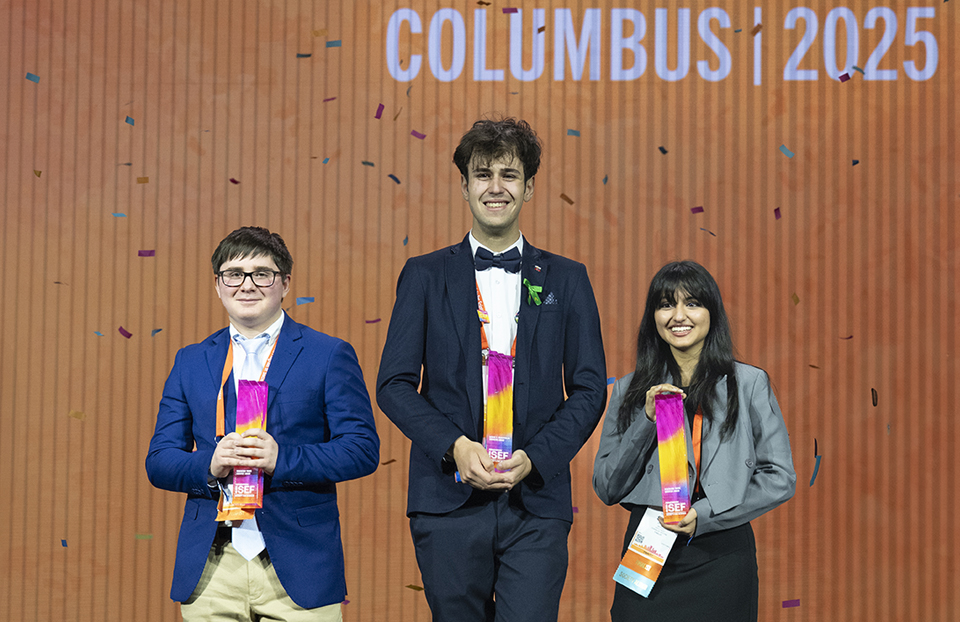Watch: STEM Leaders discuss hot topics in research, academia, innovation and entrepreneurship at Regeneron ISEF 2022
During Regeneron ISEF 2022, finalists participating both in person and virtually had the chance to hear from prominent leaders across different areas of STEM and ask questions about their experience.
To kick the sessions off, Joe Palca, a correspondent with National Public Radio, hosted a conversation about Excellence in Science & Technology with Elizabeth Blackburn, 2009 Nobel Prize Winner in Physiology or Medicine and Professor at the University of California, San Francisco; Martin Chalfie, Nobel Laureate and Professor of Chemistry at Columbia University; Dr. Francis Collins, Former Director of the National Human Genome Research Institute and Dr. Roderic Pettigrew (ISEF 1967), CEO of Engineering Health and Inaugural Dean of the School of Engineering Medicine at Texas A&M University.
When asked “how do you pick one scientific question to pursue?” Elizabeth and Francis provided some insight to their processes.
Elizabeth: In biological sciences, you are often limited by the technology that you can use. So, I always try to guide people and myself. I’ve done this to think of what new kind of technology coming on the scene will allow us to ask some question that hadn’t been asked before in biology. When DNA sequencing was first born —which was decades ago —it was in the very early stages; it suddenly allowed us to say what’s at the ends of chromosomes. So, I think all questions in biology at least turn out to be interesting in one way or the other. And part of the choice, at least, is what is possible. Also of course, what do you find interesting. So those are the two things, what’s possible and what’s interesting to you.
Francis: Oftentimes, questions come to you that are of various sorts. Some of them are the kind of thing where you could be pretty sure if you did a particular experiment, you’re going to advance knowledge by a certain degree because you have a pretty good sense of what’s already known, and there’s another step that you could take. And those are kind of interesting, worthwhile and productive. But then there are the big, hairy questions that may be high risk and you might just fall on your face and never come up with an answer. But if you did, that would be groundbreaking. I would say to people who are still in the earlier part of their scientific vision: think about those big questions. If you’re going to spend a career in science, why not work on something profoundly important? You can do incremental stuff along the way too, but don’t miss the chance to do something that’s really going to be groundbreaking.
President & CEO of the Society for Science and Publisher of Science News, Maya Ajmera, moderated the second panel which discussed Innovation, Entrepreneurship and Impact. Maya interviewed George Chen (ISEF 2006) the cofounder of CoolCrop and Assistant Professor of Information Systems at Carnegie Mellon University; Ulyana Horodyskyj (STS 2003, ISEF 2000-2003), the Founder of Science in the Wild and a Climate Communication Specialist; Ashley Sarracino (ISEF 1999-2000), the President of Native Ascension, LLC; Matthew Tamayo (ISEF 2002), the Founder & CEO of OpenLattice and Mo Zerban (ISEF 2010), the Founder of Tern Water.
When asked about how entrepreneurship can supplement scientific research and how vital entrepreneurship is to furthering advancements in science, Mo and Ashley shared their thoughts.
Mo: What got me into entrepreneurship was the desire to implement science on a larger scale. I’m a big believer that there’s more to science than what’s implemented at the moment. And if we can implement more solutions, the world will be a better place. So, I think that’s something that got me into entrepreneurship. And I always say entrepreneurship is the research of people, instead of the research of science. You have to study investors, customers, so on and so forth. You move on from the central focus on science to the focus being on people, and it’s an exciting switch.
Ashley: I would go a little bit further (than what Mo said), into the constraints that are within government when you go and work for somebody else. I believe that through entrepreneurship, you really have the opportunity to be completely innovative with no constraints. You have the ability to control your own destination, and with your projects that you’re working on here, let’s say some of you are on the verge of getting patents. If you have patents, entrepreneurship is really the way to go because there’s no constraints and the sky is the limit.
In the final panel of the day, Seema Kumar, Vice President of Innovation, Global Health and Policy Communication for Johnson & Johnson facilitated a conversation for women in STEM. Panelists Dapo Ajayi, Vice President of Technical Operations and Supply Chain Strategy, Johnson & Johnson; Rebecca Bunnell, Director of the Office of Science, Centers for Disease Control and Prevention; Cassandra Quave (ISEF 1994-1996), Associate Professor, Emory College of Arts and Sciences and Curator, Emory University Herbarium and Jaszianne Tolbert, Senior Director of U.S. Clinical Development, Oncology at Janssen discussed why it’s important to continue making space for women in STEM.
When posed with the questions, What were some challenges you’ve faced in the science as a woman? and, Were there any times you wanted to quit, and how did you overcome that?, Dapo and Cassandra provided advice on facing difficult times and persevering.
Dapo: I think as a female leader, particularly in supply chain, when I started my career, I looked upwards and there were no senior women in supply chain. So, initially in my career it was a case of not necessarily understanding what opportunities were for me. I think also as a woman in a male dominated environment, it meant that I needed to work hard to be taken seriously, to be seen as that technical expert, for assumptions to not be made about me in terms of the role that I was playing in the meeting room because I was a female, because there were certain roles for women and they weren’t necessarily the technical leadership roles. So, I think I had to overcome some of those perceptions. My personality is such that I want to overcome that challenge. The worst that can happen is I can fail and if I fail, it’s not the end of the world.
Cassandra: I think anytime you face a serious setback or your place in a room or in an environment is questioned, I’ve had my place in workspaces outright questioned, you can either crawl back within, which is the instinct that I naturally have, or you can take a breath and say, “Well, actually, no, I do belong in this space. I’m an expert in X, Y, Z and I’m here for purpose Z.” But it takes courage and it’s not always easy, but you do feel better after you make a stand for yourself.
Thank you to the Society for Science, Rise and Johnson & Johnson for sponsoring these inspiring and insightful events.


